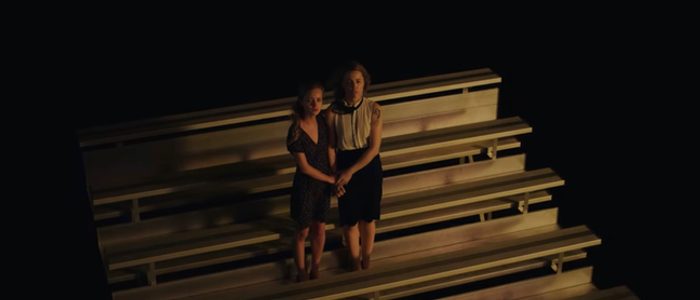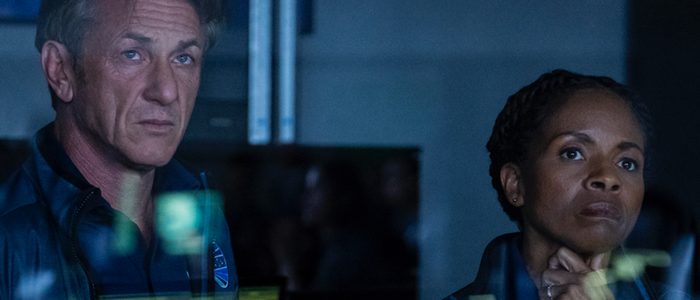Hulu's 'The First' Is A Down-To-Earth Sci-Fi Drama About Looking To The Heavens, And Beyond
The First, the latest original series from Hulu and House of Cards creator Beau Willimon, is an engrossing, engaging drama about several characters connected to the first manned mission to Mars. While the red planet may be the ultimate destination, this show is more about the earth-bound lives of its ensemble, and the emotional issues they each grapple with. Read our The First review below."Everyone you love, everyone you know, everyone you ever heard of, every human being who ever was, lived out their lives on a mote of dust suspended in a sunbeam," wrote astronomer Carl Sagan. That quote is referenced in the first episode of The First, and ultimately serves as a mission statement for the entire first season of Hulu's new sci-fi drama. Set in a not-too-distant future, The First is, on the surface, the story about the first manned mission to Mars. But getting to the red planet is really secondary when all is said and done. The First isn't about the destination – it's about the journey. It is a thoughtful, often melancholy show – a show about sacrifice, and grief, and raw, ugly emotions. Here is a saga about living, and dying, and everything in between.As The First opens, a mission to Mars suffers a major setback (to say what that setback is would be giving away a spoiler, but let's just say it happens in the first twenty minutes of the very first episode, and knocks you on your ass). Now, Vista, the aerospace company behind the Mars mission, has to work hard to mount a new, flawless expedition. The clock is ticking, and the whole world is watching.This setup might make you think The First is going to unfold like The Martian or Interstellar, and turn into a sci-fi exploration story. But that's not what happens here. Instead, the show begins focusing in on each of its cast of characters – members of the mission, people working behind the scenes, and all their extended families. This is a very human drama, where all the science fiction tech takes a backseat to story.Sean Penn is astronaut Tom Hagerty, the commander of the mission in the midst of a kind of crisis. His daughter, Denise (Anna Jacoby-Heron), is a recovering drug addict with severe mental problems, and the thought of blasting off into space for two years and leaving her behind is causing understood anxiety. Denise, meanwhile, is haunted by the suicide of her mother – a death Denise witnessed, and was unable to stop.In addition to Tom, we spend plenty of time with the rest of the crew. LisaGay Hamilton is Kayla, Tom's second-in-command who feels hurt that she was passed over as commander, and thinks this choice might have something to do with the fact that she's a queer black woman. Other crew members include Sadie Hewitt (Hannah Ware), an inexperienced astronaut who just doesn't quite fit in, and Nick Fletcher (James Ransone), who has experience, but isn't quite as sharp as his fellow crew members. Keiko Agena is astronaut Aiko Hakari, who worries about her mother's increasing dementia.Then there's Laz Ingram (Natascha McElhone), the CEO of Vista, a woman very hard to read, and considered by some to be cold and heartless (late in the season it's hinted that she might actually be on the Autism spectrum, but this is never confirmed). McElhone has a tough balancing act here, starting off as something of a villain before turning into a more rounded, sympathetic character. The actress delivers, mixing a cold aloofness with a very relatable sense of longing. All of these actors – as well as supporting players, including character actor extraordinaire Bill Camp as a journalist, and Oded Fehr as an engineer – shine brightly here, with almost all of them receiving their own individual episodes. Sean Penn is particularly good, playing Tom as someone incredibly weary, and incredibly wary. He delivers his lines in a clipped, halting, pained manner, as if finding the right thing to say is a constant struggle. Anna Jacoby-Heron makes a big impression as Penn's troubled daughter Denise. On paper, the character could've been a bit of a cliche, but Jacoby-Heron find the right balance, playing Denise as if she's in a never-ending struggle with her own personal demons. One of the season's best episodes, "Two Portraits", revolves almost entirely around Denise's memories, as she flashes back and forth to her childhood with her mother, and to the aftermath of her mother's suicide. The episode is handled in an abstract, expressionist way, with blank sets and characters surrounded by impenetrable darkness. It's almost like watching a stage play, and the result is surprisingly haunting. One of the most memorable shots of the whole season comes from this episode, as we see Denise and her mother (Melissa George) standing on a platform set standing in the middle of a black void, both women looking up to the heavens, the fiery flicker of rocket blasters cast across their blank faces. It's an almost apocalyptic image, and it puts us fully inside Denise's troubled mindset.Characters gazing up to the heavens is a running motif in The First. Time and time again, someone will walk out into the night and look up – staring into that never-ending, ever-expanding darkness; at skies choked with stars, like so much broken glass spilled out across a pitch-black blanket. Each glance appears to be loaded – with longing, with wonder, with rage. The characters are looking up, and looking beyond. And wondering.One of the many good things The First has going for it is its entirely episodic nature. Unlike so many modern streaming shows, which play out like 10-hour movies broken up into chunks, The First wisely lets almost every single episode stand on its own. Each is like a short story, and you could convincingly watch one without watching the other (though why you'd want to do that I don't know). This makes for a more engaging viewing experience, and as a result, The First never runs of out of fuel.While this is a science fiction show, the future-tech on display here is almost always believable, and never over-done. Here is a world of complete automation – all cars are self-driving, all TVs and lights and other household appliances are controlled by voice command. None of this is far-fetched – we're headed there already. One of the show's most ingenious ideas is to have everyone possess a pair of stylish sunglasses, not entirely unlike Google Glass, that enable them to view text messages, or videos, or VR-like scenarios. The First also finds ways to work the tech into the storylines, like when McElhone's CEO, distraught after a setback, tries to kill herself by ordering her car to drive at her at full-speed (luckily, the car has safety features, and stops short at the last minute – something McElhone's character likely knew would happen, but decided to take her chances anyway).But the tech, like the journey to Mars, is not what The First is about. Instead, it gives Hulu the chance to carve out yet another wonderful original series, and give other streaming giants a run for their money. We care about what's happening in The First, because the show is excellent at generating empathy. At bringing us within the individual worlds and universes of its cast of characters. The First may ultimately take us into space and beyond, but it's feet remain firmly here on earth. This isn't a show about taking flight. Instead, it's about human beings living out their lives on a mote of dust suspended in a sunbeam.
One of the season's best episodes, "Two Portraits", revolves almost entirely around Denise's memories, as she flashes back and forth to her childhood with her mother, and to the aftermath of her mother's suicide. The episode is handled in an abstract, expressionist way, with blank sets and characters surrounded by impenetrable darkness. It's almost like watching a stage play, and the result is surprisingly haunting. One of the most memorable shots of the whole season comes from this episode, as we see Denise and her mother (Melissa George) standing on a platform set standing in the middle of a black void, both women looking up to the heavens, the fiery flicker of rocket blasters cast across their blank faces. It's an almost apocalyptic image, and it puts us fully inside Denise's troubled mindset.Characters gazing up to the heavens is a running motif in The First. Time and time again, someone will walk out into the night and look up – staring into that never-ending, ever-expanding darkness; at skies choked with stars, like so much broken glass spilled out across a pitch-black blanket. Each glance appears to be loaded – with longing, with wonder, with rage. The characters are looking up, and looking beyond. And wondering.One of the many good things The First has going for it is its entirely episodic nature. Unlike so many modern streaming shows, which play out like 10-hour movies broken up into chunks, The First wisely lets almost every single episode stand on its own. Each is like a short story, and you could convincingly watch one without watching the other (though why you'd want to do that I don't know). This makes for a more engaging viewing experience, and as a result, The First never runs of out of fuel.While this is a science fiction show, the future-tech on display here is almost always believable, and never over-done. Here is a world of complete automation – all cars are self-driving, all TVs and lights and other household appliances are controlled by voice command. None of this is far-fetched – we're headed there already. One of the show's most ingenious ideas is to have everyone possess a pair of stylish sunglasses, not entirely unlike Google Glass, that enable them to view text messages, or videos, or VR-like scenarios. The First also finds ways to work the tech into the storylines, like when McElhone's CEO, distraught after a setback, tries to kill herself by ordering her car to drive at her at full-speed (luckily, the car has safety features, and stops short at the last minute – something McElhone's character likely knew would happen, but decided to take her chances anyway).But the tech, like the journey to Mars, is not what The First is about. Instead, it gives Hulu the chance to carve out yet another wonderful original series, and give other streaming giants a run for their money. We care about what's happening in The First, because the show is excellent at generating empathy. At bringing us within the individual worlds and universes of its cast of characters. The First may ultimately take us into space and beyond, but it's feet remain firmly here on earth. This isn't a show about taking flight. Instead, it's about human beings living out their lives on a mote of dust suspended in a sunbeam. The First premieres September 14, 2018 on Hulu.
The First premieres September 14, 2018 on Hulu.
